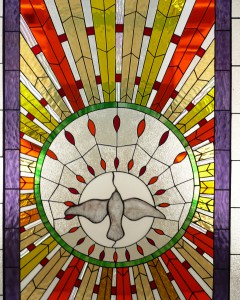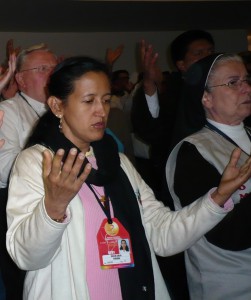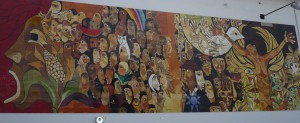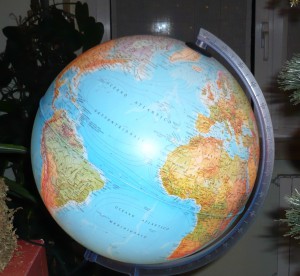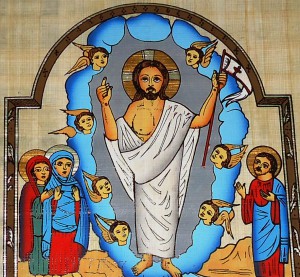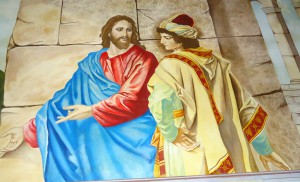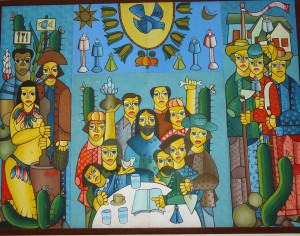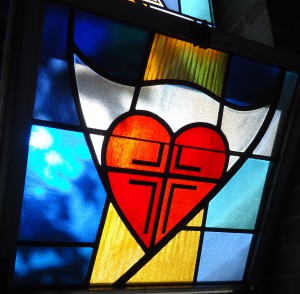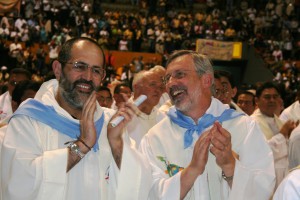On Friday May 22, we had another meeting of the CLM candidates in Viseu. The theme of this training unit was Laity in the Church – a lay and missionary spirituality presented by Carlos Barros.
We started watching a movie that touched me very much “Selma march of freedom” which chronicles the struggle that Martin Luther King had to fight to grant the right to vote for every person, which ends with an epic march from Selma City to Montgomery, Alabama, and prompted President Lyndon B. Johnson to sign the Voting Rights Act in 1965.
On Saturday Carlos told us of spirituality, has talked a lot, but some of the phrases that marked me were “spirituality is a path to God,” “is a love relationship with Christ,” which is “life fed by Christ”. Christian spirituality is not just for some, it is a lifestyle…
We had the opportunity to reflect on the identity of the CLM in Articles 4 and 5 of the directory in which they asked us to think of some questions:
- How do I evaluate my spirituality in the light of these Articles of the CLM directory?
- Through this training process, have I gained awareness about some aspects contained in these articles?
- Are there any points in these articles where I feel that I have not yet succeeded? What are they? Why?
- Do you think that someday you will guide your life by the principles contained in these articles?
During the Saturday morning, we were still surprised to receive the visit of Palmira Pinheiro – Comboni Missionary Secular, newcomer of the mission; she shared some of her missionary life.
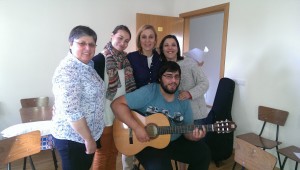 After the meal, which was nice, and with reinforced powers, it was time to return to work. Carlos continued talking about spirituality, and more specifically Lay Spirituality where we discussed the role of the laity in the Church and, indeed, following Jesus is “a demanding and challenging task”. We must take an active role, being available to serve and not to be served. We must be radical to assume “the call to live the mission as Christians moved by faith and not by work”.
After the meal, which was nice, and with reinforced powers, it was time to return to work. Carlos continued talking about spirituality, and more specifically Lay Spirituality where we discussed the role of the laity in the Church and, indeed, following Jesus is “a demanding and challenging task”. We must take an active role, being available to serve and not to be served. We must be radical to assume “the call to live the mission as Christians moved by faith and not by work”.
During the evening prayer we reflect on “Go you also into the vineyard,” where Jesus invites us to be part of his vineyard, not just religious, but all the faithful laity, all the baptized, because we are united by Baptism. Each of us is part of the Church, when someone is not present, the church is poorer.
Jesus also invites us to live a different life as Lay, he invites us to live detached from material goods, family ties (which is for me the most difficult to think or imagine …) and have the courage to go … not be afraid to say “Yes Father, I am here…”.
In the evening we received the testimony of Fr. Ginno Pastor in Skype (new technologies do wonders like this) where we hear his mission experience, always in Mozambique, where it showed that Fr. Ginno talked about it with love. His smile when talking about the mission, his words radiated love for others, an example of which was poor with the poor, someone who was certainly one of them while living in the mission… The phrase that touched me more of his testimony was “the smile of the other pays for everything 🙂 .”
The night dragged on because it was a great night, Pentecost, where we had a small vigil where each of us was able to share what is “being Church” writing in a bunch of grapes when we feel as Church…” I am church when…”.
On Sunday morning we participate in the Eucharist with the community of Viseu, and was nice to feel the presence of the Holy Spirit … it was a very special moment. I felt again the desire to be radical, to be different and do what I do by faith and not by obligation, as someone said, “If it is inside and not out of obligation this reflected”. It is necessary to believe in the words of Pope John Paul II: “Christ takes nothing away, only gives” and is with the certainty of this love for us, which I continued commitment as a Christian… and I hope every day to say the Lord “Here am I…”.
Andreia Martins (CLM candidate)








